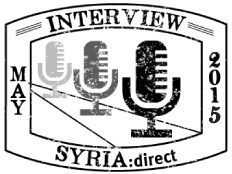Grim prospects for Deir e-Zor youth refusing to join Islamic State
Aside from a few regime-held pockets, the Islamic State controls […]
27 May 2015
Aside from a few regime-held pockets, the Islamic State controls most of Deir e-Zor province, yet the provincial capital is the primary battleground between IS and regime forces with the city essentially split in two.
With casualties stacking up in Deir e-Zor, both the Syrian army and the Islamic State are becoming increasingly strapped for troops. Both sides have resorted to mandatory conscription. This means young Syrians in Deir e-Zor must make difficult decisions; join the regime or IS, be arrested, or leave. This choice is even more complicated for Syrians who were active members of the opposition.
“Many young people were fighting IS until the situation reached the point where some youth joined the National Defense Forces militias [shabiha] and Assad’s shock troops following the violations committed by IS against the people of eastern Syria,” Abu Mujahid a-Sharqiyah, a former soldier in the Free Syrian Army, tells Syria Direct’s Ammar Hamou.
Recently, a-Sharqiyah received a message from the Islamic State demanding that he join and go fight in Iraq. “The notification came to me through the [FSA] brigade that I was active with before the arrival of IS. However, I completely refused to join, which led me to contemplate leaving,” said a-Sharqiyah.
A-Sharqiyah did end up leaving Deir e-Zor for the adjacent province of Al-Hasakah, where is unable to find work in the regime-controlled area he now lives in. As a Syrian from the far east of the country, he is perceived among pro-regime Syrians as being in the opposition.
Here, a-Sharqiyah recounts his experience as a protest organizer in the early days of the revolution, then joining the FSA and finally, to the decision to put down his arms and leave Deir e-Zor only to live under regime control once again. Now unemployed and with few prospects, the former fighter says “I live off of what help I can get.”
Q. How was your life before the beginning of the Syrian revolution? Did you have a role in the early days?
I lived in the city of a-Shahil in the Deir e-Zor countryside. At that time I was a high school student. With the outbreak of the Syrian revolution, I began to organize demonstrations with students. We carried out media coverage of these demonstrations and broadcast it.
Q. After the revolution developed, what is now called the Free Syrian Army emerged and became the revolution’s armed body on the ground. Did you participate in that?
Yes, since the formation of the Free Syrian Army I was a part of it and fought the Syrian regime until the emergence of the Islamic State, who stabbed us in the back. It was necessary to oppose them. But after violent battles with IS, they were able to take over Deir e-Zor, compelling me to put down my weapons at the time.
Q. During a previous interview with Syria Direct, you told our reporter that IS informed you that you needed to join their ranks. How did the message get to you? How did you deal with it?
The notification came to me through the [FSA] brigade that I was active under before the arrival of IS. However, I completely refused to join, which led me to contemplate leaving.
Q. How did you leave your city? Where did you flee to and what dangers did you face?
I left the city, passing by the IS checkpoints. As I was going through them, they checked my personal documents, but Allah blinded their eyes and I was able to leave the areas under their control. Unfortunately, I returned to the arms of the criminal regime, since I went to Al-Hasakah, which is controlled by the Syrian regime. I chose it considering it was not under IS control, it was the closest place, and because I couldn’t travel outside of Syria as a result of my previous position [in the FSA].
Q. Do you think that your situation is similar to those of other young people suffering through the same thing and exposed to the same pressures?
Of course there are tens of cases like my own in the eastern region [of Syria] alone. That is because many young people were fighting IS until the situation reached the point where some youth joined the National Defense militias and Asad’s shock troops following the violations committed by IS against the people of eastern Syria in general, and members of the a-Shaitat tribe specifically.
Q. What are your current activities and how are your daily needs met?
Originally I am from the east in Deir e-Zor so I am unable to work in regime-controlled areas. This makes me face numerous problems in terms of housing and food. However, I live off of what help I get.







